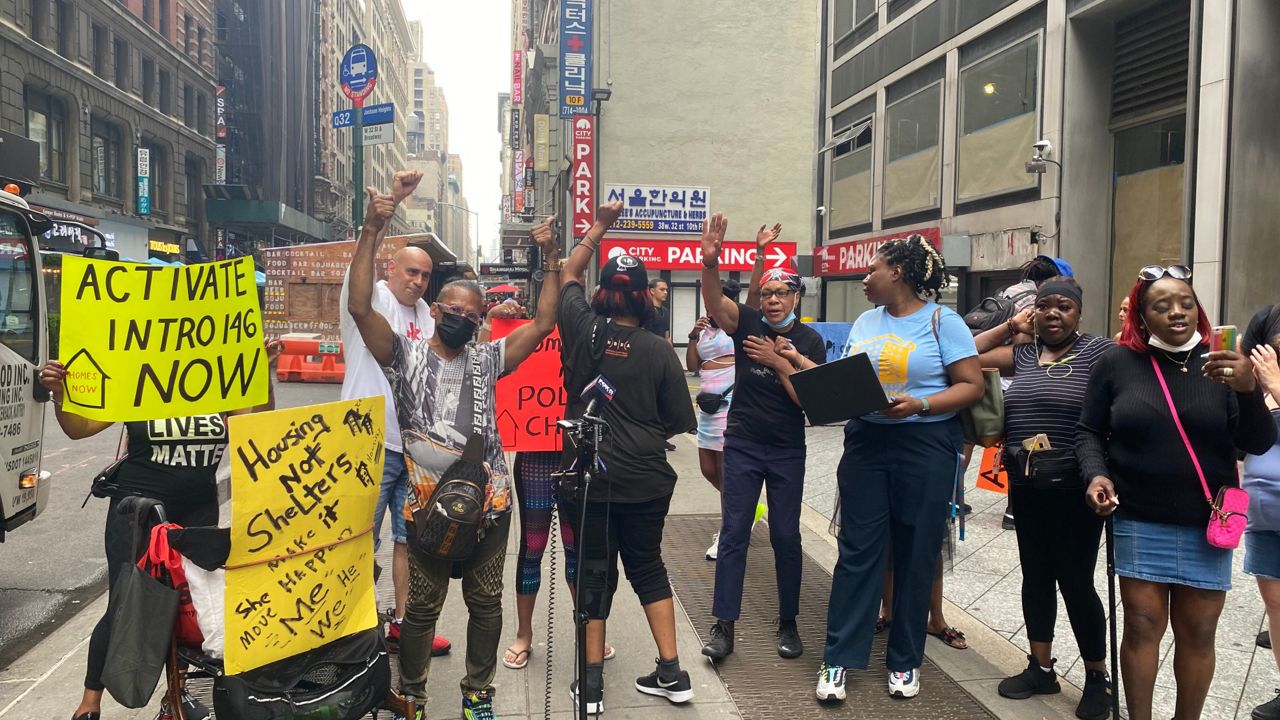Women residing at the Hotel at Fifth Avenue in Midtown Manhattan spoke out on Monday against the city’s plan to move them back to congregate housing shelters.
“When they talked about moving us out of here, I started having nightmares,” said Asia Townsend, one of the hotel residents, at Monday’s news conference held by the residents outside the hotel.
Last year, the de Blasio Administration moved thousands of homeless New Yorkers out of shelters and into hotels to protect them against COVID-19.
During the height of the pandemic, about 20% of the city’s hotels were operating, at least in part, as homeless shelters.
But as the city lifts most pandemic restrictions, the city is also phasing out its use of hotels and is moving 8,000 homeless New Yorkers staying in 60 hotels back to the shelter system.
To date, the city has transferred residents out of 23 hotels, a spokesperson for the city's Department of Homeless Services said.
The transfer of residents from the Hotel at Fifth Avenue, who are women with disabilities, was originally scheduled to take place last Friday.
But the move was brought to a halt after the Legal Aid Society filed a motion in federal court accusing the city of violating the rights of homeless New Yorkers with disabilities by transferring people en masse.
“They were in the process of moving them,” said Helen Strom, a supervisor with the Safety Net Project, a housing rights organization. “People were being loaded onto the bus and we got them to pause the move.”
In the motion, Legal Aid wrote that the city is “recklessly rushing the process” and circumventing their responsibility under the law to afford homeless New Yorkers reasonable accommodations.
According to Isaac McGinn, a spokesperson for the Department of Homeless Services, the city has granted what it calls hundreds of reasonable accommodations for disabled homeless New Yorkers, including advance notice for upcoming transfers.
"As we phase out the temporary use of COVID-period commercial hotels, we and our not-for-profit provider partners are also working closely with clients to assess each individual’s unique needs and grant their Reasonable Accommodation (RA) requests, through a process agreed to in court,” McGinn said.
But residents at Hotel at Fifth Avenue said they were not given timely updates about their housing status.
The judge is expected to decide Tuesday on whether a temporary restraining order will be granted on all transfers of disabled homeless New Yorkers from hotels to shelters.
The city’s plan to open hotels back up for business and transfer homeless people to congregate shelters comes amid an uptick in coronavirus cases due to the delta variant.
Chantel Estrella, 31, has been staying at the Hotel at Fifth Avenue for about a year now, but news about the delta variant has been weighing on her mind.
“If it’s so [bad with] COVID, why are you not putting us and leaving us where we are safe?” said Estrella, who works at a nearby Burger King.
As of June, more than 6,300 out of nearly 46,000 clients in the shelter system had been vaccinated, although the latter number includes children younger than 12 who are ineligible for the vaccine.
“You’re going to move me from a single-room occupancy, to put me in an environment where there’s a lot of people, you don’t know about COVID, you don’t know who's walking in and who’s infected and who’s not,” said Enid Mendez, who has been living in the hotel for more than a year.
Most of the women residing at the hotel are living with various conditions, such as asthma, heart ailments and mental health disorders.
The medical care at the hotels has been “way better than the shelters,” Estrella said.
“Since it's so many people and everybody's bunched up in a room, it's hard to figure out, pinpoint who's who,” said Estrella about the struggle to get medical care at shelters.
A doctor can easily find people in their assigned hotel rooms, and the privacy of hotel rooms makes a big difference, she said.
The women waiting to find out the fate of their residency at Tuesday’s hearing say the move back to a shelter is a step backward on their path toward the ultimate goal — stable housing.
“My hope is that they get us to where we need to get to,” Mendez said. “We set up a goal. Let's get to our goal, not set up a goal and then divert us elsewhere. My goal is to get my apartment, get stability, have my kids right, and move forward in the future.”
If the judge rules against a temporary restraining order on the transfers, it’s not clear how quickly the city will arrange for the transfer.
“It’s unclear exactly when they'll do it, but they've been moving very quickly with these transfers overall,” Strom said.



